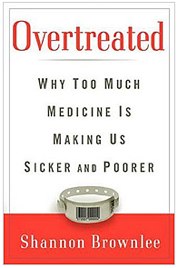Americans already save money by purchasing prescription drugs from Canada and getting plastic surgery in South America.
health care

Save On Medical Expenses With Healthcare Credit Cards
Citibank and Bank of America both offer special credit card programs based on health and medical expenses. If you’re disciplined about not carrying revolving debt, and you have recurring medical expenses, they can help reduce your total cost over a year. Bank of America’s cards are point-based programs—if you’ve got Aetna insurance, you can accumulate points that you can turn into “cash direct deposits to a health savings account, or other standard rewards.” Caremark members can redeem points for awards only, although BoA’s standard awards catalogue “includes health and wellness products like fitness equipment and blood pressure monitors.”

Federal Agency Kills Lifesaving Hospital Checklist Program
The Office for Human Research Protections recently shut down a Johns Hopkins University program that had intensive care units across Michigan following “a simple five-step checklist designed to prevent certain hospital infections.”

"Overtreated" Says Too Much Healthcare Is Bad For Us
The general theme of the book “Overtreated,” the New York Times’ pick for best economics book of the year, is that we can cut a significant percentage of our health care costs—”between one fifth and one third,” says the author—and not have any impact on our level of health. As a nation, we tend to err on the side of too much treatment, exposing ourselves to unnecessary risks and racking up fees on procedures we could do without. And since doctors depend on a piecemeal approach to earning income, while at the same time dealing with significant financial risks from malpractice suits, they tend to push for more treatment, not less (they need to earn a living while also protecting themselves from accusations of doing too little).

10 Secrets Of Primary Care Physicians
The latest SmartMoney list of insider secrets and unpleasant truths is just as bleak as every other news item about health care these days, starting with the fact that a primary care doctor—”someone to coordinate your health care, help choose your specialists and be the first to diagnose just about any problem”—is getting harder to find, and fewer med students are showing any interest in the (comparatively) low-paying profession: “the number of primary-care internal medicine residency positions dropped by more than 50% in the past decade.”
../../../..//2007/10/16/us-taxpayers-and-medicare/
“U.S. taxpayers and Medicare patients could have saved almost $15 billion in 2007 if private health insurers had cut expenses for prescription drug coverage and negotiated bigger discounts,” according to a newly released (Democratic) government report. [Reuters]

Poverty Makes You Healthier!
The decreased caloric intake and increase in non-motorized modes of transportation following Cuba’s economic crisis from 1989-2000 lead to a decrease in heart disease and diabetes, a University of Michigan study finds.

AARP Can Double Costs For Seniors
The L.A. Times is reporting that AARP products are not always the best deal for senior citizens. The American Association of Retired Persons is susceptible to a profit motive; $400 million – 40%, of their annual budget – is generated from “royalties and service provider relationship management fees” gleaned from products, such as Medigap insurance, sold to its 38 million members.

Medical Records Are The New Credit Score?
Just like an error on your credit report can affect your score, an error on your medical records can have an impact when you’re applying for insurance, according to the Wall Street Journal.

Proposed Legislation In Ohio Would Require Women To Get A Man's Permission To Have An Abortion
New proposed legislation in Ohio would make it illegal for a woman to get an abortion without a man’s permission, according to the Record-Courier.

Cuomo Threatens Insurance Company Over Plans To Rank Doctors By Cost
New York Attorney General Andrew Cuomo told UnitedHealthcare to expect a lawsuit if they publish a ranking of doctors based on the cost of care to the insurer. UnitedHealthcare caused a furor in Missouri after introducing a similar ranking scheme in 2005.
Missouri doctors cited numerous objections to the pilot program, which was halted and is being redesigned. For example, most faculty members of the Washington University School of Medicine in St. Louis were initially excluded from the quality rankings because university-based care is generally more expensive. Doctors in major specialties were ranked by cost alone.

Will Walmart Be Your New Doctor?
Millions of Americans don’t have health insurance, and many of them are Walmart shoppers. Heck, many of them are Walmart employees. The solution? Walmart is opening 400 more “health clinics” in the next 2-3 years. Eventually, there will be over 2,000 of these clinics.

Consumer-Directed Health Plans: Do You Like To Gamble?
Recently insurance companies, and George Bush, have been championing a new kind of health-care called “consumer-directed health plans.”
Sucky Hospital Workers Launch Investigation Against Reader
Longtime Consumerist reader and commenter AppTechie went through a real horror show after his 3 year old son fractured his arm.
Avoid Medical Bill Sickness
Staying in a hospital can feel like the song in Les Miserables where they charge you if the window sash is down, and charge you if it’s up. Luckily, FiveCentNickle’s got a good writeup on avoiding getting nicked and dimed on your medical expenses.

The Fragmented Status Quo of US Health Care
We got a lot of mostly thoughtful point/counter-point in the comments section of our anecdotal post about Socialized Health Care the other day. Many of them pointed out that the US Health Care system is certainly not without its long wait lines, and that this is symptomatic of a health care system in which millions of uninsured can not afford to treat minor ills until they finally have to go to the ER as a venue of last resort, for the sort of stomach aches and flus that is easily treated in more nascent stages by antibiotics or a quick doctor’s visit. It’s a different spin on the same problem: in Ireland, the system is taxed by the universally insured, whereas in the States, the uninsured jam up the cogs with what should be trivial ailments that have spiraled out of control.




